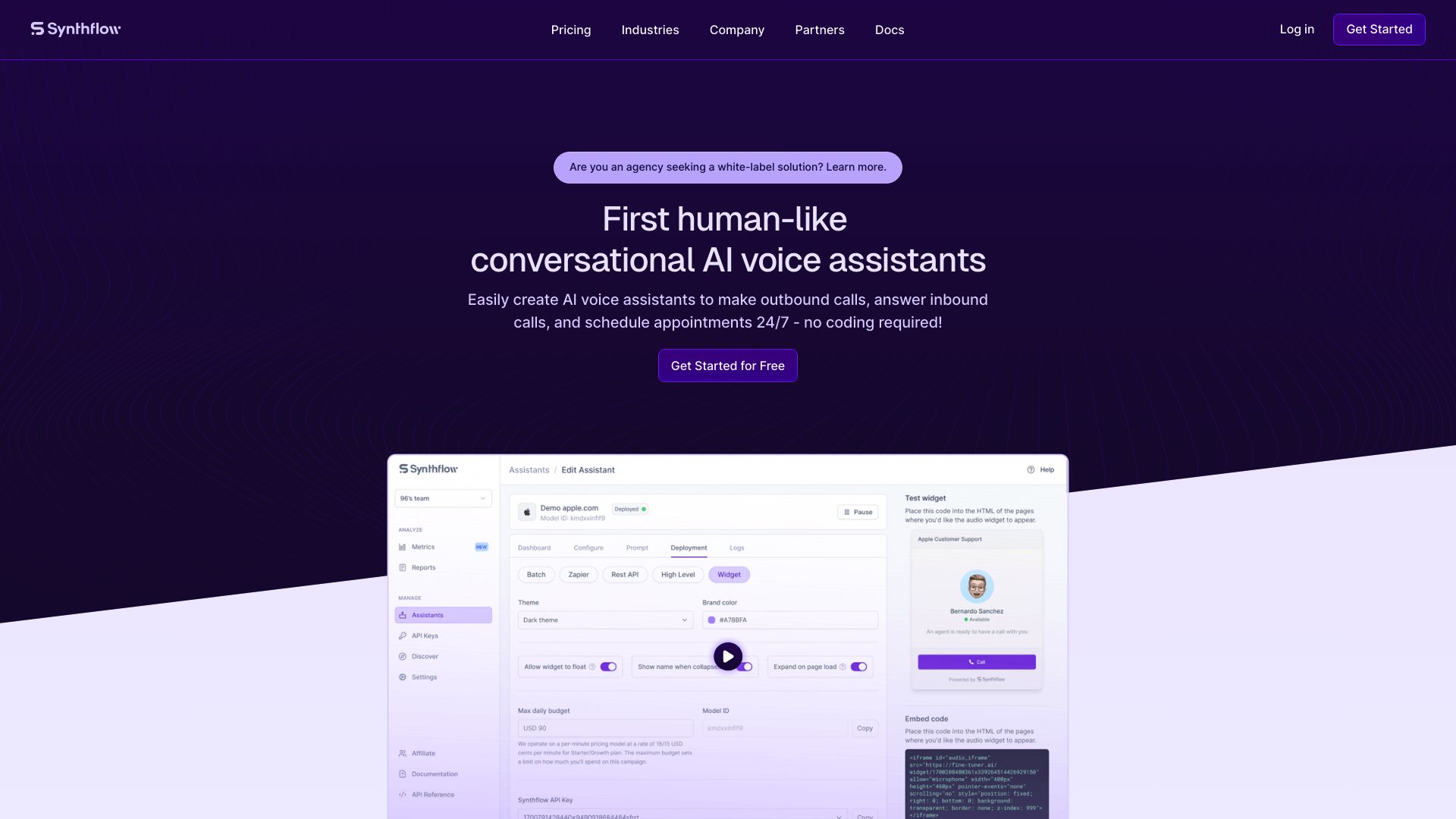Synthflow vs. DevGPT: Comparing AI-Powered Development Tools
AI-driven development tools transform how businesses create software and engage with customers. Synthflow empowers non-technical users to build AI voice assistants, while DevGPT automates coding tasks for developers. This comparison explores how these platforms streamline workflows, enhance productivity, and push the boundaries of AI application in business. We’ll examine their unique features, integration capabilities, and overall impact on software development and customer engagement. By understanding the strengths and limitations of Synthflow vs. DevGPT, readers will gain insights into choosing the right AI tool for their specific needs, whether they’re looking to create voice-based customer service solutions or accelerate their coding processes.
Synthflow Overview
Synthflow empowers businesses to create customizable AI voice assistants without coding expertise. The platform’s no-code interface and pre-built templates make it accessible to users with varying technical backgrounds, from developers to business professionals.
Synthflow empowers businesses to create customizable AI voice assistants without coding expertise.


Synthflow’s AI assistants excel in diverse applications, including customer support, lead generation, and appointment scheduling. The platform prioritizes data security, offering unlimited secure storage in a dedicated Pinecone environment. Integration capabilities with tools like 11Labs and Twilio enhance functionality, allowing businesses to seamlessly incorporate AI assistants into existing workflows.
The visual builder simplifies the creation process, enabling users to design AI agents with distinct personalities aligned with their brand. Synthflow supports both development and production environments, facilitating testing and deployment without impacting live systems. The platform’s scalability accommodates growing business needs, supporting batch deployments for large-scale communication campaigns.
While Synthflow focuses primarily on voice AI, it lacks explicit support for multimodal interactions combining text, voice, and visual inputs. The platform compensates with robust problem-solving capabilities, enabling AI assistants to handle complex tasks such as issue triaging and information provision. Synthflow’s commitment to transparency is evident in its clear documentation and insights into AI decision-making processes.
Synthflow’s vision centers on democratizing advanced AI technologies, aiming to streamline operations and enhance customer engagement across industries. By providing tools that adapt to various business needs, regardless of technical expertise, Synthflow positions itself as a catalyst for personalized and efficient customer interactions, driving business growth and satisfaction.
DevGPT Overview
DevGPT transforms natural language prompts into executable code, streamlining software development workflows. This open-source AI assistant integrates with GitHub and Jira, automating routine coding tasks and generating pull requests from tickets.


DevGPT leverages GPT-4 and Codex to power its code generation capabilities. The platform trains on a developer’s codebase, producing context-aware snippets that match individual coding styles. Users can edit and refine generated code through comments, ensuring output aligns with project requirements.
DevGPT leverages GPT-4 and Codex to power its code generation capabilities. The platform trains on a developer’s codebase, producing context-aware snippets that match individual coding styles.
Productivity gains stand out as a key benefit, with initial users reporting over 10 hours saved weekly on repetitive coding tasks. This time-saving allows developers to focus on complex problem-solving and innovation.
While DevGPT excels at automating routine coding, it lacks some advanced features found in comprehensive AI platforms. The tool currently focuses on individual developers and small teams, potentially limiting its scalability for enterprise-wide deployment. Additionally, DevGPT’s specialization in code generation means it may not offer the breadth of AI capabilities required for diverse business applications beyond software development.
Feature Comparison
Synthflow and DevGPT offer distinct approaches to AI-powered development, with each platform focusing on different aspects of the software creation process. Synthflow excels in creating customizable AI voice assistants without coding, while DevGPT specializes in transforming natural language prompts into executable code.
In terms of core components, Synthflow provides a comprehensive no-code visual builder that allows users to design and deploy AI agents with unique personalities. This feature enables non-technical users to create sophisticated voice assistants for tasks like customer support and lead generation. DevGPT, on the other hand, lacks a visual builder but compensates with its ability to generate context-aware code snippets that match individual coding styles.
Regarding security features, Synthflow prioritizes data protection with encryption methods and secure storage in a dedicated Pinecone environment. DevGPT’s open-source nature may offer less built-in security, potentially requiring additional measures for enterprise-level data protection. While both platforms aim to streamline development processes, Synthflow’s broader range of integrations and deployment options contrasts with DevGPT’s more focused approach on code generation and GitHub integration.
Feature Comparison Table
| Synthflow | DevGPT | SmythOS | |
|---|---|---|---|
| CORE FEATURES | |||
| Hosted Agents (Dev, Production) | ✅ | ❌ | ✅ |
| Environments (Dev, Production) | ✅ | ❌ | ✅ |
| Visual Builder | ✅ | ❌ | ✅ |
| No-Code Options | ✅ | ❌ | ✅ |
| Autonomous Agents | ✅ | ❌ | ✅ |
| Explainability & Transparency | ✅ | ❌ | ✅ |
| Multimodal | ❌ | ❌ | ✅ |
| Multi-Agent Collaboration | ✅ | ❌ | ✅ |
| Audit Logs for Analytics | ✅ | ❌ | ✅ |
| Bulk Work | ✅ | ❌ | ✅ |
| Agent Work Scheduler | ✅ | ❌ | ✅ |
| Logs & Monitoring | ✅ | ❌ | ✅ |
| SECURITY | |||
| Constrained Alignment | ✅ | ❌ | ✅ |
| Data Encryption | ✅ | ❌ | ✅ |
| OAuth | ✅ | ❌ | ✅ |
| IP Control | ❌ | ❌ | ✅ |
| COMPONENTS | |||
| Foundation AIs | ✅ | ❌ | ✅ |
| Huggingface AIs | ❌ | ❌ | ✅ |
| Zapier APIs | ✅ | ❌ | ✅ |
| All other APIs, RPA | ✅ | ❌ | ✅ |
| Classifiers | ❌ | ❌ | ✅ |
| Logic | ✅ | ❌ | ✅ |
| Data Lakes | ❌ | ❌ | ✅ |
| DEPLOYMENT OPTIONS (EMBODIMENTS) | |||
| Deploy as API | ✅ | ❌ | ✅ |
| Deploy as Webhook | ✅ | ❌ | ✅ |
| Staging Domains | ❌ | ❌ | ✅ |
| Production Domains | ❌ | ❌ | ✅ |
| API Authentication (OAuth + Key) | ✅ | ❌ | ✅ |
| Deploy as Site Chat | ✅ | ❌ | ✅ |
| Deploy as Scheduled Agent | ✅ | ❌ | ✅ |
| Deploy as GPT | ✅ | ❌ | ✅ |
| Scalability | ✅ | ❌ | ✅ |
| DATA LAKE SUPPORT | |||
| Hosted Vector Database | ✅ | ❌ | ✅ |
| Sitemap Crawler | ✅ | ❌ | ✅ |
| YouTube Transcript Crawler | ✅ | ❌ | ✅ |
| URL Crawler | ❌ | ❌ | ✅ |
| PDF Support | ❌ | ❌ | ✅ |
| Word File Support | ❌ | ❌ | ✅ |
| TXT File Support | ❌ | ✅ | ✅ |
Best Alternative to Synthflow and DevGPT
SmythOS stands out as the superior alternative to Synthflow and DevGPT, offering a comprehensive platform for AI agent creation and deployment. Our drag-and-drop interface simplifies the development process, making advanced AI capabilities accessible to users of all skill levels. Unlike Synthflow’s focus on voice assistants or DevGPT’s code generation, SmythOS provides a versatile ecosystem for building and managing AI agents across various applications.
We offer unparalleled flexibility with our extensive integration options, supporting APIs, AI models, and tools from multiple providers. This adaptability allows SmythOS to fit seamlessly into existing workflows and business processes, surpassing the more limited integration capabilities of Synthflow and DevGPT.
SmythOS excels in scalability and deployment options, features notably absent in DevGPT and limited in Synthflow. Our platform enables users to deploy AI agents as APIs, webhooks, scheduled tasks, or even GPTs…
SmythOS excels in scalability and deployment options, features notably absent in DevGPT and limited in Synthflow. Our platform enables users to deploy AI agents as APIs, webhooks, scheduled tasks, or even GPTs, providing a level of versatility that neither Synthflow nor DevGPT can match. This flexibility ensures that SmythOS can adapt to diverse business needs and grow with your organization.
Security and data management are paramount in SmythOS. We implement robust data encryption, OAuth authentication, and IP control features, addressing enterprise-level security concerns that may be overlooked by open-source solutions like DevGPT. Additionally, our support for various data formats and sources, including PDF, Word, and TXT files, as well as web crawling capabilities, surpasses the more limited data handling of both Synthflow and DevGPT.
By choosing SmythOS, users gain access to a platform that not only matches but exceeds the capabilities of Synthflow and DevGPT. Our commitment to user-friendly design, coupled with advanced features like multi-agent collaboration and autonomous agent capabilities, positions SmythOS as the ideal choice for businesses and developers seeking to harness the full potential of AI technology.
Conclusion
Synthflow and DevGPT offer unique approaches to AI-powered development, each with distinct strengths. Synthflow excels in creating voice assistants without coding, while DevGPT focuses on automating code generation. Both platforms streamline development processes, but in different ways.
While Synthflow and DevGPT have their merits, SmythOS emerges as the superior choice for businesses seeking comprehensive AI solutions. Our platform combines the best of both worlds, offering a no-code visual builder for creating AI agents and supporting advanced coding capabilities. SmythOS’s versatility extends beyond voice assistants or code generation, encompassing a wide range of AI applications.
SmythOS stands out with its extensive integration ecosystem, supporting over 300,000 integrations and various AI models. This flexibility allows businesses to create tailored AI solutions that seamlessly fit into existing workflows. Our platform’s ’Create Once, Deploy Anywhere’ approach ensures that AI agents can be easily integrated across multiple environments, maximizing their utility and impact.
For businesses ready to harness the full potential of AI, SmythOS offers the ideal solution. Explore our diverse range of AI-powered agent templates to jumpstart your journey into AI automation. Create a free SmythOS account today and experience the future of AI-driven business solutions with no risk or commitment. Transform your operations and drive innovation with SmythOS – where cutting-edge AI meets unparalleled ease of use.
Last updated:
Disclaimer: The information presented in this article is for general informational purposes only and is provided as is. While we strive to keep the content up-to-date and accurate, we make no representations or warranties of any kind, express or implied, about the completeness, accuracy, reliability, suitability, or availability of the information contained in this article.
Any reliance you place on such information is strictly at your own risk. We reserve the right to make additions, deletions, or modifications to the contents of this article at any time without prior notice.
In no event will we be liable for any loss or damage including without limitation, indirect or consequential loss or damage, or any loss or damage whatsoever arising from loss of data, profits, or any other loss not specified herein arising out of, or in connection with, the use of this article.
Despite our best efforts, this article may contain oversights, errors, or omissions. If you notice any inaccuracies or have concerns about the content, please report them through our content feedback form. Your input helps us maintain the quality and reliability of our information.
